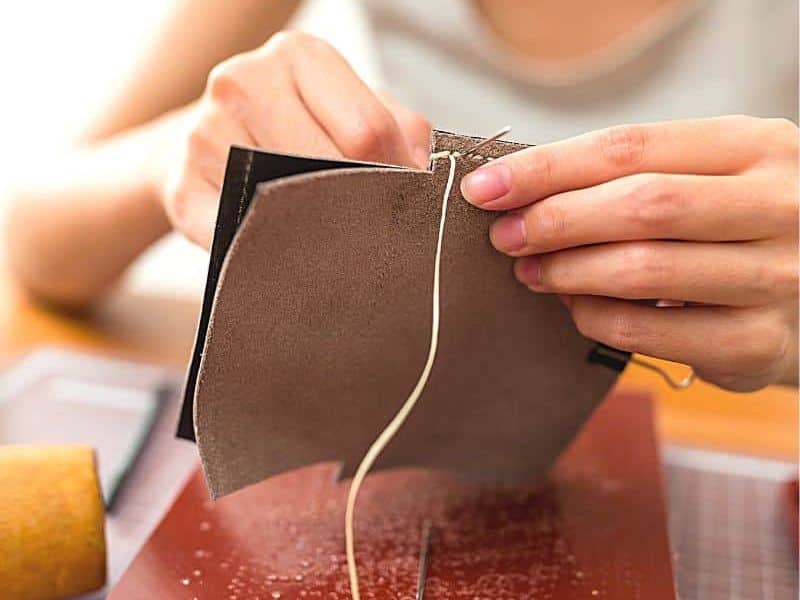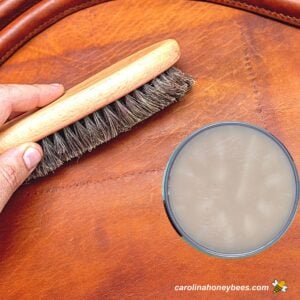Beeswax for Leather
For hundreds of years, artisans have understood the power of using beeswax for leather cleaning and conditioning. Whether used as an aid in the creation of new products or to give new life and shine to old favorites, this beeswax leather conditioner will not let you down. It protects the leather surface and gives it a shiny new look. Best of all, you can make your own right at home.

Whether you are an expert at DIY products or new to the idea, leather care is just one of a multitude of popular uses for beeswax. This easy recipe will help you ensure the longevity of your prized positions.
How Beeswax Protects Leather
Real leather is made of animal skin. A tough sturdy material it is perfect for many uses. Leather is a common material used to make everything from horse saddles to shoes, purses, belts and more.
Of course, the leather is prepared in a way that helps it maintain strength for a long time. But, all leather needs periodic cleanings or it will dry out and even crack.

When beeswax is applied to leather it offers a bit of waterproofing protection. Raindrops and little splashes tend to run off the surface – rather then soaking in.
In addition, beeswax helps hold in some of the natural leather moisture and helps to inhibit excessive dryness and cracking.
It is also useful in the creation of leather items. Laces lubricated with beeswax are easier to use for stitching. This makes the construction of purses, wallet etc – much easier.
Another benefit of using beeswax in leather craft is its role as a good edger. When burnished into the edges of leather items – it helps seal out water.

This post may contain affiliate links. As an Amazon Associate, I earn from qualifying purchases. Please read my disclosure.
Materials
- shea butter
- sweet almond oil
- coconut oil
- beeswax
Shea Butter
Shea butter is a natural product that is made from the nut of the Shea tree. This tree is found in Africa and inhabitants have used the rich nut butter in a variety of ways for centuries.
Shea is known to help moisturize old leather pieces. It is also commonly used in many moisturizing products for human skin. I use it in my beeswax body butter and also this homemade face moisturizer with beeswax.
Sweet Almond Oil
Sweet Almond Oil is rich but not as greasy as some liquid oils. This makes it a good partner for leather care. It also absorbs well into the leather surface. You can use olive oil instead if you wish.
Coconut Oil
Coconut oil is readily available – you can buy it almost everywhere these days. In this recipe, it helps soften up the beeswax and make it easier to work with. Not the best product for leather care on its own – it is a good part of the team.
Beeswax
Beeswax is made by honey bees. This natural wax is used to create the honeycomb structure that becomes their home. Thankfully, they make enough to share.
Beeswax is used in thousands of ways in and around our homes. It is available for purchase in a variety of forms: pellets, blocks, bars, or large chunks.
If you purchase raw beeswax from a local beekeeper, be sure to render or clean your beeswax properly. This is important to remove any bits of dirt, etc.
How to Use Beeswax on Leather
One of the beauties of using beeswax leather conditioner is that it does not require a lot of it to get the job done. Even small amounts properly applied can give a durable finish.
Also, I like the idea of using a natural product rather than those containing paraffin and other petroleum by products.
Make sure that the leather surface is clean. Brush away any dirt or mud before proceeding. Likewise the leather surface should be dry and warm – or at least not cold.
For the wax and oil mixture to work into the leather surface, we need the leather to be at least room temperature.
When using beeswax to waterproof my old farm boots, I actually heat the boot before working the mixture in the shoe leather.
Use a small soft piece of towel or cleaning rags and apply a small amount of beeswax leather conditioner to the surface. Gentle small circular motions help work the materials in.
Let the item sit for several minutes (15 or so), then use a clean soft cloth to wipe away any excess product.
This leaves a thin coat of beeswax on the surface to protect, soften and condition the leather grain and texture.
Not Best for Leather Furniture
As wonderful as beeswax is as a leather preserver, it is not the best product to use on leather furniture. I would also not use it on car seats for the same reasons.
It provides enough lubrication to prevent hardening of the leather on most items. But, on large furniture surfaces, it can have a stiff, waxy feel – chair, couches etc.
For those purposes, one of the commercial products that are specifically blended for leather would be a better choice (Pine resin, cod oil and beef tallow are common leather preservers too).
Expert Tips
While this beeswax recipe for leather care is a great way to protect your expensive items, there are some things you should keep in mind.
- Both beeswax and coconut oil have the tendency to darken leather. If you have a concern about this, try it on a small inconspicuous spot first.
- Use only a small amount. You will have better results using a small amount of conditioner rather than using too much.
- Beeswax has a low melting point 147° F. Don’t overheat your wax when melting
- If using on new leather products during construction – don’t apply until after the dyeing process. Wax is a sealer and will interfere with the proper coloring.
- This recipe makes a medium consistency form of leather polish.
- If you find that you wish to have a softer polish, re-melt your ingredients and add a bit more sweet almond oil or coconut oil.
More Ideas
Beeswax is a wonderful gift from the hive. Once you realize all the things it can do – you may want to explore more projects.
Don’t throw away any leftovers. You can use it to make some natural beeswax wraps, or these beautiful little beeswax sewing cakes.
And of course, don’t forget that you can make your own beeswax furniture polish. It is a nice protector for wood surfaces.
Small items like these or homemade beeswax lip balms are some examples of many beeswax gifts you can make that don’t cost a lot of money.
FAQs
The frequency of application of beeswax to leather depends on how often the leather is used and whether or not it is exposed to harmful conditions. Leather boots would need care more often that a purse only carried on special occasions.
Beeswax is generally safe for colored or dyed leather. However, you should always test a small inconspicuous area first.
While beeswax serves well to waterproof leather items, it may not make the product completely waterproof. Avoid submersing leather items under water when possible.
Yes, beeswax can be beneficial for rejuvenating old, cracked leather by reducing the appearance of cracks. However, extremely damaged leather may require professional restoration.
Final Thoughts
Using beeswax for care of leather goods is a great way to naturally prolong the life of your items without using nasty chemicals. Sometimes we spend so much money on commercial products that don’t work any better than our homemade DIY products. Learn what a little beeswax can do for you.

DIY Beeswax for Leather Cleaning Recipe
This post may contain affiliate links. As an Amazon Associate, I earn from qualifying purchases.
Read my Disclosure.Supplies
- 1/4 cup beeswax (57 grams)
- 2 tablespoon shea butter (27 grams)
- 1/4 cup coconut oil (54 grams)
- 2 tablespoon Sweet Almond Oil (28 grams)
Instructions
- Slowly melt shea butter and beeswax in a double boiler or similar container.

- Add coconut oil (it may be a solid or liquid depending on the temperature)

- Add sweet almond oil and stir ingredients together.

- Pour into a wide mouth container and allow to cool. I had more than enough for one tin – so I put the rest in a wide mouth jar for my Mom.






